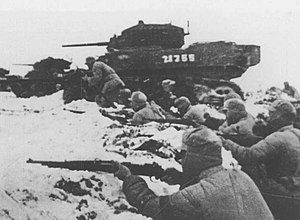Okay so I decided that doing the battles individually was taking too long and quite frankly I was not enjoying it in any way. So now I have my list with a brief description on why this battle is here and a link to more information about it.
10. Battle of Tours
Charles the Hammer defeats the Umayyad Caliphate, mostly due to sheer luck. This stops the Muslim advance into modern day France and allows the Christian kingdoms to strengthen. Remember Charles the hammer's son Pepin the short is able to be anointed king of the Franks and Charles grandson is Charlemagne.
9. Battle of Zama
Scipio Africanus defeats Hannibal and secures victory for Rome in the second Punic war. After this Rome has no rival in Europe.
8. Battle of Huai-Hai
This battle is why Communist China wins the Chinese Civil war. Pretty simple, if this battle goes the other way we have a possible very different china and very different cold war. Also Guns and roses would have had to have a different album title for Chinese democracy.
7.
Battle of Waterloo
Napoleons most famous battle. If he wasn't high on opium he might have won and a very different France. I doubt he would have been able to reconquer Europe but Europe may have looked very different.
6.
Battle of Salamis
Far more important than Thermopylae as the Greeks actually win this battle and win it very decisively. The Greek fleet smashes the Persian fleet and Xerxes's army is unable to do anything in Greece as a result and retreats back to Persian territory.
5.
Battle of Cannae
This battle is unique on the list as the loser is the reason why this is so important. Rome had another army smashed by Hannibal and not just smashed but destroyed the largest army Rome had ever formed. But Rome doesn't lose, any other nation would have capitulated but Rome just keeps chugging along and their Italian allies stay loyal. Hannibal has really lost the war here because if this isn't going to bring Romes allied states in Italy over to him nothing will.
4.
Battle of Gaugamela
Alexander earns his title of THE Great by defeating the Persian empire led by Darius III. This is the ultimate achievement for Alexander as he will wander around the east for years after this because he is sort of crazy (okay he's just plain crazy), but after his death Persian, Egypt and all the other places he conquered up to the edges of India are divided up by his generals and remain Greek cultured empires for quite some time. Even after these kingdoms fall the Greek influence remains.
3.
Battle of Badger Mouth
Probably the single most important battle most in the west have never heard of. To be fair nobody in the west would have possible heard about this for quite some time as China is considered a place of Myth in Europe until the Mongols show up. The Mongol army led by Genghis Khan handily defeats the army of Jin China, but Jin exists for some time after this and isn't completely conquered until Genghis's successor Ogedei does so 20 years later. Whats really important about Badger Mouth is that this is really the only place where someone, anyone might have turned the Mongols back, but after this they are so superior to any other opponent that nobody can come close to matching the Mongol armies.
2.
Battle of Vienna
People tend to think that in 1492 Columbus opening the Americas up to Europe makes Christian Europe the dominant force in the world, but in 1683 the Ottoman Empire controlled all of south east Europe and were besieging Vienna. This is a point where Christendom in Europe is at war with itself as the protestant reformation had begun over 150 years earlier and the Muslim Ottomans took advantage of this. The only reason why Vienna doesn't fall is because the Holy Roman Empire along with the King of Poland, Catholic and protestant alike, attacked the besieging Ottoman army and relieved the city. If Vienna falls then the Ottomans have a major foothold in modern Austria and an advance into Northern Italy or Southern Germany could be on the table. Also apparently the Croissant was invented during the battle, so there was that.
1.
Battle of Stalingrad
2 million casualties, that is the estimated number of casualties at the battle of Stalingrad from Soviet and axis forces. There are an estimated half a million soviet deaths in this one battle which is more than any other Allied nation has during the entire war, except for China. It is five months of nonstop fighting between the two most powerful nations in the world at this time as they trow everything they have into this one city on the Volga river. People sometimes say that Hitler had no chance to win the war against the Soviet Union, but even after failing to capture Moscow in operation Barbarossa I believe that he does if Operation
Braunschweig, the plan to capture the Soviet Oil fields, can succeed.This is the battle where everything turns, after the loss at Stalingrad Germany cannot win and the Soviet Union pushes Nazi Germany out of Soviet Territory and eventually into Germany itself. Think about this, if Stalingrad falls early on or if otherwise Operation
Braunschweig suceeds then Soviets lose their oil fields and all lend lease shipments have to go through Vladivostok and across Siberia. Could the Soviet Union have continued? Maybe, but its also a very real possibility that they would not have.

